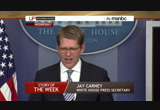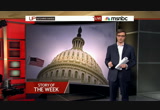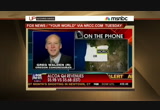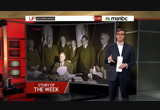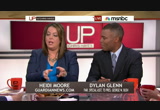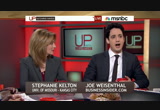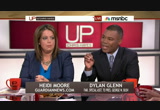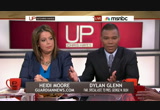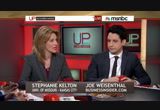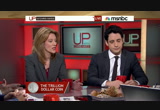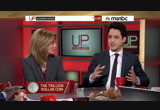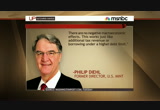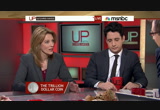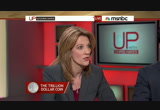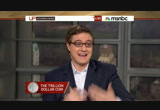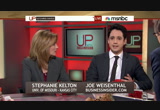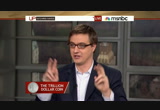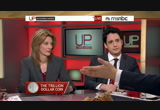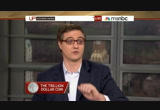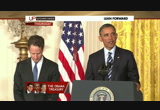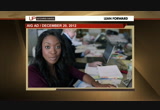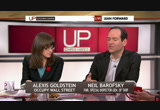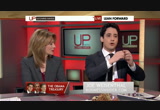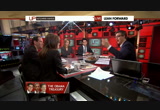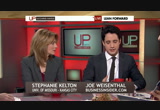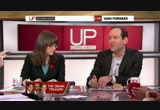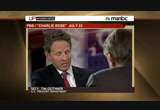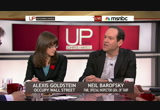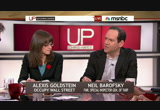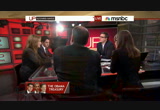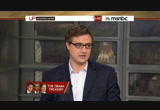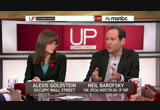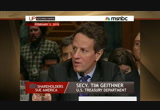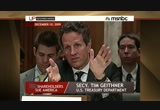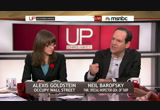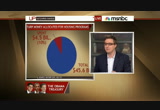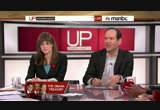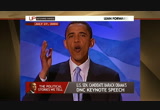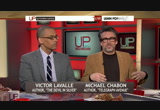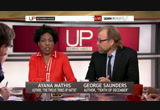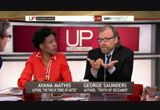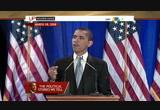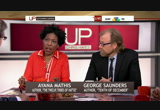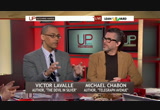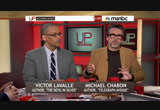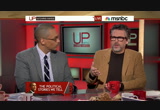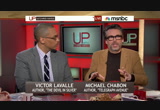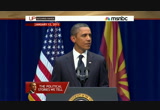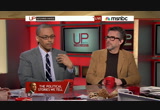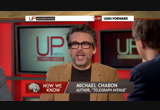tv Up W Chris Hayes MSNBC January 12, 2013 5:00am-7:00am PST
5:00 am
y in a child, or signs in a woman, which may include changes in body hair or a large increase in acne, possibly due to accidental exposure. men with breast cancer or who have or might have prostate cancer, and women who are or may become pregnant or are breastfeeding, should not use androgel. serious side effects include worsening of an enlarged prostate, possible increased risk of prostate cancer, lower sperm count, swelling of ankles, feet, or body, enlarged or painful breasts, problems breathing during sleep, and blood clots in the legs. tell your doctor about your medical conditions and medications, especially insulin, corticosteroids, or medicines to decrease blood clotting. so...what do men do when a number's too low? turn it up! [ male announcer ] in a clinical study, over 80% of treated men had their t levels restored to normal. talk to your doctor about all your symptoms. get the blood tests. change your number. turn it up. androgel 1.62%. sven gets great rewards for his small business! how does this thing work? oh, i like it!
5:01 am
[ garth ] sven's small business earns 2% cash back on every purchase, every day! woo-hoo!!! so that's ten security gators, right? put them on my spark card! why settle for less? testing hot tar... great businesses deserve great rewards! [ male announcer ] the spark business card from capital one. choose unlimited rewards with 2% cash back or double miles on every purchase, every day! what's in your wallet? here's your invoice. good morning from new york. i'm chris hayes. president obama said american troops in afghanistan will shift to a support role by spring and by the end of next year americans war in afghanistan will be over. the flu is now reached epidemic levels according to the centers for disease control although it may be peaking in some parts of the country.
5:02 am
right now, my story of the week. the magic coin. odds are by now you heard something about the trillion dollar coin ideas that thanks in part to others has managed to catapult from the margins of the internet to the center of beltway conversation. the idea first proposed in 2010 by a george jrnlg lawyer commenting on a blog under the screen name beta wolf has received endorsements from a number of members of congress. on wednesday white house spokesperson jay carney fielded a question about the proposal from our own chuck todd. >> follow up on debt ceiling. i know your position hasn't changed. do you have a position on this trillion dollar coin business? >> i would simply go back to what i said. the option here is for congress to do its job and pay its bills. bills that have already been racked up.
5:03 am
>> will you totally rule it out? >> you can speculate about a lot of things. but nothing needs to come to these kinds of, you know, speculative notions about how to deal with a problem that is easily resolved by congress doing its job. >> okay. sure. but if congress doesn't do its job, here's how the coin would work. republicans are once again threatening to hold the debt ceiling hostage as they did in the summer of 2011. they will not raise the amount they can borrow. we're already slated for european levels of austerity this year. if no deal is reached, the u.s. has to start stiffing its creditors, deciding how to prioritize payments which will cause markets to freak and interest rates to spike. enter the coin. it turns out there is a subsection of the u.s. code called dominations specifications and design of coins that includes the following profession. the secretary may mint and issue platinum coins and proof
5:04 am
platinum coins in accordance with such denominations may prexrip from time to time. the original intent of this legislation is to give the secretary of the treasury latitude to issue kmemtive coins for collectors but the plain meaning of the statute is clear. they can issue a platinum coin in any domination as the secretary of the treasury designates. the idea of trillion dollar coin advocates is the president would direct the treasury to mint a trillion dollar coin and deposit it in the bank account if he federal reserve and we have a trillion dollars more in the bank and we don't have to worry about the debt ceiling. if this sounds surreal or magic magical, you are not wrong. it's bizarre enunprecedented. even if it's illegal, it seems to run against our expectations of how the government does and should behave. it's the kind of thing that
5:05 am
justice isn't done. but that is the entire point. behavior of individuals is constrained by the formal rules, implicit prohibitions that are not spelled out but just not done. and what they have excelled at in the era of obama is exploiting the gap between the two. they've made a habit of doing the thing that just isn't done. requiring a 6 o vote majority for every procedural vote wasn't done. and then republicans did it. refusing to confirm any candidate for an open position because you object to the positions very existence just wasn't done but senate republicans did precisely that with the newly kree aed consumer protection bureau. and most clearly before the summer of june 2011, they didn't use the debt ceiling as a bargaining clip to extract ransom and they didn't credit default as a means to gain political leverage. the president is reticent to meet this degradation of
5:06 am
previous norms with ideas of his own. but there is no way to unilaterally maintain norms. once they're gone, they're gone. the only way to produce a new set of healthy norms is do some innovating your own. idea spookz republicans because it is so out of character and would gleefully and violently their own expectations of how democrats play the game. the national republican congressional committee is ballistic on the idea railing against the coin. nrcc chair greg walden says they have rushed into the fray. >> the last thing we need is for the treasury to just simply mint a new coin made out of platinum that would weigh 44 million pounds if tied to the value of platinum. that would sink the titanic. >> the only problem here is that he completely n lly misunderstae
5:07 am
idea, a new trillion dollar coin wouldn't be made of a trillion dollars of platinum. it's really just an invention. john kenneth once said the process by which banks create money is so simple but the mind is repelled. the same can be said of how our government creates money. the simple truth it is creates money out of thin air. someone at the federal reserve punches in a number in a spread cheat and more money. and in moments of crisis, this monetary magic that helped the u.s. avoid catastrophe. this cartoon from lincoln's time shows and fdr ditched the gold standard to get us out of the great depression. they were about as ridiculous as a trillion dollar coin then. there are rules that guide legal tender. what makes money valuable is social convention, a norm. we all agree it's valuable so
5:08 am
it's valuable. the genius of the trillion dollar coin isn't it provides much needed leverage against a foe unincumbered, it illustrates the uncomfortable reality of modern capitalism. money is nothing more than a shared illusion. it's a kind of magic. is it good magic or bad magic? we're going to ask my panel right after this. >> announcer: meet jill. she thought she'd feel better after seeing her doctor. and she might have, if not for kari, the identity thief who stole jill's social security number to open credit cards, destroying jill's credit and her dream of retirement. now meet amanda. with a swipe of her debit card, she bought some gas... and an all-expense-paid trip to hawaii for ben. ben is the identity thief who used a device called a skimmer to steal her information from her card to open a fraudulent account. every year millions of americans just like you learn that a
5:09 am
little personal information in the wrong hands could wreak havoc on your life. this is identity theft, and no one helps stop it better than lifelock. lifelock offers the most comprehensive identity theft protection available. ordinary credit monitoring services tell you after your identity has been stolen; they may take 30 days to alert you! too late for amanda. with lifelock's 24/7 proactive protection, jill would have been alerted as soon as they noticed an attack in their network, before it was too late. and lifelock's bank account takeover alerts would have notified amanda in time to help protect her money. lifelock guards your social security number, your money, your credit, even the equity in your home. while identity theft can't be completely stopped, no one protects you better than lifelock. and lifelock stands behind that, with the power of their $1 million service guarantee. you have so much to protect, and nothing to lose when you call lifelock right now and try 60 days of identity theft protection risk-free.
5:10 am
5:11 am
5:12 am
and joe weisenthal, one of the earliest and most outspoken evangelists for the trillion dollar coin started the mint the coin hash tag. >> i promoted it. >> i've done this monologue about the coin. when i got to the table you said that gave me goosebumps. you said it was chilly. so let me start with you. let me start with the skeptics here. heidi, you wrote this piece. you think this is a ridiculous idea is everyone is getting trolled. >> which is self-evident. but i think kind of to take it to the base, it sounds like, okay, here the thing. congress is not going to default. congress is not allowed to not pay its debts. so when you say we are going to create an imaginary coin to face your imaginary default, it's like i'm going to take my nerf bat and ruin your super soaker. this is not real and the deficit is real. we can be talking about
5:13 am
education, programs that are going to be cut and we're not doing it. >> the realness -- let's establish the realness here first. if they do go over -- if they don't vote to raise the debt ceiling, there will be consequences. >> absolutely. >> there's no disagreement about that, right? >> clearly. >> yeah. >> one of the arguments that republicans and sort of apologists for the house gop frequently make is that well, you know, this whole idea of a default and we've taken ten times more revenue every day than we pay in interest payments which is not technically true. there are days we don't take in as much revenue as there are interest payment that's day p it's a discussion about whether we're going to pay past promises or not. let's say we wer're not going t default on the system, we're a rich country debating are we going to honor our promise that's we've already made which is already preposterous. it's not this super soaker-nerf thing. it's a real threat of not paying our bills.
5:14 am
this is a real situation. >> it is a real threat? >> you know, i think that it certainly not a threat that is priced into the market today. >> so the market is pricing it in but this is a bluff? >> i think the market thinks it's a silly conversation in washington. >> i'm not talking about the coin. i'm talking about the republican -- i'm saying it's in response to the idea that republicans would take us through a partial default. >> let me be an apologist for the congressional majority here. >> fire away. >> i think the markets, governments around the globe would like to see the united states government be responsible and i think that responsible thing is figuring out a way to not give an additional credit card to a child that is already spent to its borrowing limits without putting in place some sort of regime that changes habits. >> but every time i hear this from someone and particularly someone who does work in financial markets, you have to
5:15 am
give me a coherent account of why that is not being priced in right now. everyone will go around saying you have to have long term deficit reduction. trsh r treasuries are trading real interest rates. >> but at some point the music stops. >> you have to give an account why they are not pricing the proper risk of debt. >> first and foremost, i think markets are smart enough to know this is the currency of the world and so on and so forth. second of all, if, you know, if the policymakers in washington, d.c., aren't grown up enough to come up with a scheme that enables us to meet our current obligations which everybody around this table and everyone in the country knows we will, but at the same time be responsible in the future on new obligation that's we take on, you know, then there's a problem.
5:16 am
>> talk about this responsibility and talk about the role that currency plays in this. i think the idea of the trillion dollar coin is interesting and important and it's from a game theory perspective, you have two people playing chicken. it allows one side to make a kind of similar bluff that other side can. so it sort of weirdly gives us equal leverage. so it gets to something profound about whether or not dylan is right about we have to responsibly pay off the debts. >> he's not right. and the reason he's not right, look, we always -- we don't pay off the debt. we will never pay off the debt. what the u.s. government does is redeem treasuries. and there's a difference. when you and i go into debt, we pay by transferring liability of a third party. when the u.s. government issues debt, they don't transfer liabilities of anybody else. it issues the own currency to redeem the outstounding debt. they can never run out. the u.s. government can never run out of dollars. they come from a united states
5:17 am
government. they don't come from china. we're not going broke. we're not putting our children into bankruptcy. >> we're putting the balance sheet at work which is fine. we don't even need a coin, actually. that's where we are. >> this is a way, by the way, i should explain to people we're putting the federal balance sheet to work, we increased the money supply in different methodologies during the crisis. the trillion dollar coin idea and it's fun because it has austin powers aspect to it is a way of doing sterilize -- what is called sterilizing easing throughout back door, right? it's a way to create an accounting mechanism that expands the monetary supply. >> it would allow the united states to put the federal reserve's balance sheet to work for the rest of us for maybe a change. and so when we talk about the trillion dollar coin, nobody says who's going to bite coin, where are they going to get money to do it? this is your point in the opening. if the federal reserve is required to take the cane, they
5:18 am
use the keyboard and they mark up the size of the treasury's account the same way the federal reserve pays for everything. >> yes. >> the federal reserve does not have a bank account in any other bank. there is only one way they can spend and that is by creating money out of thin air. >> so we're in the weeds now. if i'm hearing you at home and i'm even hearing you at the table now, if that that work, then let's make a ten trillion dollar coin and forget this fiscal cliff stuff and grand bargains. let's just throw it in there, man. why stop at ten? 20 trillion. why is that -- why can't we do that? >> we can do that. of course we can do that. >> there are rules. there have to be -- in order for our credibility, what the credit of the u.s. government does, what it has always done since the creation by alexander hamilton is create credibility
5:19 am
for a country that had none when it was born. if we don't treat our debt in a credible way if, we don't pay our interest on time if, we don't pay our bills, we lose the essence of what the entire government -- what all of our politics are based on. >> you're talking about paying the debt. >> there are a few things. one of the things you is say way should have a discussion about our long term future. that is a discussion to have and we can debate how to allocate our resources. it is illegitimate to have that discussion aren't debt ceiling. there are other ways we can establish leverage. it would not be great and would hurt the economy but we would not be risking our full faith in credit. people say we don't want to have this, specifically we don't want to have this conversation around the debt ceiling where there is this potential for a catastrophic effect. >> there are two ideas here. one is -- one i want to ask you if you think the kind of -- i want to get back to whether we think the republicans are
5:20 am
bluffing, right? that is an poimportant part of this. i think this is important. it's like they say, the mind is repelled that can you create ten trillion out of air. >> this is a teachable moment. >> let's teach on after the break. [ ship horn blows ] no, no, no! stop! humans. one day we're coming up with the theory of relativity, the next... not so much. but that's okay -- you're covered with great ideas like optional better car replacement from liberty mutual insurance. total your car and we give you the money to buy one a model year newer. learn about it at libertymutual.com. liberty mutual insurance. responsibility. what's your policy?
5:22 am
5:23 am
and the aerospace industry in the u.s.? at t. rowe price, we understand the connections of a complex, global economy. it's just one reason over 75% of our mutual funds beat their 10-year lipper average. t. rowe price. invest with confidence. request a prospectus or summary prospectus with investment information, risks, fees and expenses to read and consider carefully before investing. first this political question. let's stipulate. i understand, like i'm aware this idea is bofrpgers. sometimes bonker's ideas are right. >> oftentimes they're just bonkers. >> true. i also recognize if we know anything about the nature of obama presidency, it is an incredibly small conservative respect for institutional norms and a real, particular fli these kinds of procedural ways, just not real, like, innovative or outside the line. i think the odds of the white house actually ever doing this
5:24 am
or threatening to do it are incredibly slim. i want to make sure this is clear. we do have this actual political battle that is coming up. it gets to the heart of what we are talking about when we talk about debt, when we talk about the debt ceiling and the deficit. everyone throws the words around, right? this is the subject of every conversation on the beltway now. deficit-debt. my sense is essentially no one knows what those words mean. what that thing is pointing to and what the implications of the meaning of that are. before we get to that, dylan, on the political question, do you think -- i mean is the idea that we should all be thinking is the republicans are essentially hinting that they'll go, you know, cause a half shutdown but not really mean it. here is john boehner on the debt limit fight essentially seeming to indicate maybe back off and hedge a little bit. he hedges noting he is not the ultimate leverage. republican stronger card boehner believes the sequester triger that trims all discretionary
5:25 am
programs, how do you read this in terms of what they're going to do? >> i read it as responsible lawmakers will not walk us over this unprecedented silly, you know, exercise. however, it is pint of leverage. and i think that, you know, you'll probably see some sort of deal that has a short term increase in the debt limit three months, six months. and a conversation of what is the appropriate amount of spending cuts that goes along with that? >> the first part -- the funny thing about that statement, the responsible lawmakers part and is leverage is the second one has to negate the first one to be true. everyone believes the responsible lawmakers won't do it. then the leave rej dverage disa. >> they're not going to do it at the end. we're not going to default. and there is a point of leverage. actually, they are talking about exactly that. either it is or isn't. >> the three branches of government.
5:26 am
this is an appropriate conversation whether we like oirt not and how it looks around the world is not. i mean this is -- there are duly elected members of congress that have the right and constitutional right here and they should be heard and how they work through this is part of the process. >> the rubber hits the road smat point. you get to the point where you could have a situation where congress doesn't approve it at which point the executive branch has to do something to save the country. >> that's the idea behind this leverage point. now to get to the trillion dollar coin idea which is to say okay the republicans don't take us over and there is some deal cut or we swerve out of the way at the last moment. but then we had this crazy mint the coin idea that is planted in the minds of american policymakers. we say forget about the debt ceiling. why don't we just mint some coins? like i was saying before i went to break, if we can mint a trillion dollar coin, let's mint a $10 trillion coin. >> of course we can do that.
5:27 am
if we establish that treasury secretary has the capacity to mint a trillion dollar coin and deposit it, then they can put a 10 or 100 or any other number. it's at the discretion of the treasury secretary. of course they could do that. the question is should they do that? what would be the ramifications of doing that? there is absolutely no doubt in my mind that it could be done. it appears to be, by all accounts, harvard law professors, yale law professors and others -- force pors. >> this is another data point. the former mint director, the treatment of the coin is like all other coins. they transfer a trillion dollars to the treasury's general fund where it can finance government operations just like proceeds or bond sales or additional tax revenu revenues. there are no negative effects this is like borrowing over a higher debt limit. >> when the federal reserve credits the treasury's bank account, it's just digit allen
5:28 am
tris locked up. they can't run away. they can't escape. they can't chase any goods or hyper inflate. they can't dpo all of these things that people are terrified of doing. >> what are the limits then? i think the thing that -- in some ways the moral subtext of the deficit conversation is this debate about virtue, right? virtue and kind of rejuan wild. moses went to the mountain and we went crazy with the golden calf and then came down with the lord's vefrpgance. now we're going to get good again. that virtue is reducing the deficit and paying the debt. you're telling me, no, you can be like this all the time. there are no limits on the behavior. spend as much as we want and tax as little as we want. >> i didn't say that at all. no. there are limits. of course there are limits on how much you can spend. the limits are on the real side of the economy though, not on the financial side. and what we're so accustomed to hearing is we can't afford it. we can't afford it much it's
5:29 am
always the financial side. there are not enough numbers on the balance sheet. so let's take the hypothetical. i know heidi will fall out of her chair and i'll say $100 trillion. take that hypothetical. mint a $100 trillion coin. what happens? absolutely nothing in the first instance. the question is what then would happen to the dollars if congress appropriated some spending? because the government can't spend unless congress appropriates, right? if congress said we have $2.2 trillion infrastructure disaster in this country, we're going to appropriate funding to start repairing and rebuilding the infrastructure, then the funds can begin to flow out. >> then they move into the real economy. >> as long as the real resources are there, we have 23 million americans who want full time work in this country and can't find it, many of them unemployed -- >> mint a coin and put them to work. >> that's exactly what she is saying. >> why would we allow 23 million
5:30 am
americans who want to contribute, we have useful things for them to do, unemployed construction workers and manufacturing workers, they have the skill set we need and -- >> the only thing they need is this $22 trillion coin. >> 1 h$100 trillion, come on. >> it is the economy. >> you want to talk about the constraint. i want you to make the argument. the idea you is say let's play this through. we put this coin in. >> this is a hypothetical. >> this is a hypothetical. in my sense, financial markets would go bananas. the fear about the coin is fit ever came to that, it represents something toint national financial mashgs and treasury purchasers about the nature of american governmental institutional dysfunction. that would negatively impact the price of treasuries. >> fight. forget the fact that government
5:31 am
spending crowds our private sector spending which is a different conversation. the issue of our credibility in the world, we do become greece at some point. we don't want to give them money because greece can't repay its debts. and the united states government if it becomes greece in terms of the willingness to print money, you know, then we are laughingstock of the world financial markets. >> so you ask this question about constraint. >> hold that thought and tell me what constraint is. that's what i want to get to. we all agreement we'll talk about that after this break. i love to eat. i love hanging out with my friends. i have a great fit with my dentures. i love kiwis. i've always had that issue with the seeds getting under my denture. super poligrip free --
5:32 am
it creates a seal of the dentures in my mouth. even well-fitting dentures let in food particles. super poligrip is zinc free. with just a few dabs, it's clinically proven to seal out more food particles so you're more comfortable and confident while you eat. super poligrip free made the kiwi an enjoyable experience. [ charlie ] try zinc free super poligrip.
5:34 am
made the kiwi an enjoyable experience. i've always kept my eye on her... but with so much health care noise, i didn't always watch out for myself. with unitedhealthcare, i get personalized information and rewards for addressing my health risks. but she's still going to give me a heart attack. that's health in numbers. unitedhealthcare. i'd like to thank eating right, whole grain, multigrain cheerios! mom, are those my jeans? [ female announcer ] people who choose more whole grain tend to weigh less than those who don't. multigrain cheerios we're talking trillion dollar coin, of course. and, joe, we were talking about -- we got to this point where we're talking about what -- why does the government have to pay its bills? that is the fundamental question. why do they have to pay the bills? who do they pay them to? what is the constraint on the
5:35 am
government's ability with the reserve currency in the world, what is the constraint on our ability to just print money? that i think really gets the heart of the question we're talking about. >> so i think, you know, this week was the 100th birthday of richard nixon. richard nixon was the president who finally ultimately killed the gold standards. what hasn't died is the gold standard mentality that money is this commodity we can use up if we don't. that is a false constraint. there is a real constraint. let's talk about $10 trillion coin. >> you just cut her by 90%. >> let me just -- so if we put that obviously as stephanie pointed out, we put that in the bank account, there is no hyper inflation. that money isn't going anywhere. where you get a constraint is if the government said let's spend $10 trillion on infrastructure projects. then you have a real problem. you have $10 trillion worth of real resources in the economy. so you're trying to push this money into the real economy. then you would get inflation.
5:36 am
and then wage was surge. the price of commodities would surge. there is your constraint. just found it. you hit the point where you're putting too much money into real resources then you get the push back against what government does. it's not about money running out. fwz too few goods being in there to absorb that money. let's get back to something resembling reality. let's say the white house does start to make noises about doing. this again, it seems incredibly unlikely. let's say they did. or let's say this time around they don't. but it's another disastrous debt ceiling showdown and the next time, you know, jn boehner gives them a monday, right? this is grover norquist's idea. that clip where he says the leverage will have this. there are debt ceilings for a little bit. so let's say we get to a point where they say you no he what? this has become a habit now. we can't deal with. this we're going to seriously pursue this trillion dollar coin
5:37 am
idea. you write for a publication that people in financial markets read. you look at financial markets. the people in the financial markets, aren't they going to balk? isn't this going to have an adverse effect in people's judgment of the credit worthiness of the government, functionally tsh do the things we need to do? >> i don't think so. i mean look, we're already having a debate now. we are already having a debate at the highest levels about whether we're going to pay our bills or not. that is the debate we're currently having. >> can i debate that debate? i don't think we're having that debate. i think mitch mcconnell said that. >> the gop leader in the senate is debating with the president about whether we're going to pay our bills if there is not an extraction. >> he's not debating it. this is a clearly an issue of political leverage. >> that's a debate. >> constitutionally, they cannot do that. last time they threatened to do it, the blame fell on republicans disproportionately.
5:38 am
these are people who care so much about their jobs that they're willing to hold even in a political sense the u.s. economy hostage. what makes you think that they're going to be able to pull this off and keep their jobs? it's the only thing they're worried about. everyone knows that if a republican is seen as having threatened default of the u.s. government, they'll be voted out of office. if not, brought up before the u.s. government. >> here is another important point which this gets us to. with this kind of threat on the table of we're not going to raise the debt ceiling, one twi respond to that politically and our game theory sense is you're not going to raise the debt ceiling, we're going to mint a trillion dollar coin. the other way to respond is the way you're responding which is you're bluffing, right? that's clearly not true. you clearly aren't going to do that. so let's actually put all that aside. i think there is something to that. i think there is something to not making more of the threat than it should crediblebly. >> we have a spending problem in this country. everyone around this table and in the country understand
5:39 am
that's. but they don't want to do anything about it. i would argue very strongly we have a spending problem in this country and there's no political will to do anything about it. the president voted six years ago against raising the debt ceiling. so this is a little bit of a red herring and him being, you know, above the fray on this which is absolutely not true. he was complicit in trying to use it as leverage back then and has been a point of bringing people to the table. >> let me make a point about that. the norm has been that there is a symbolic vote that people will cost. >> generally. they get a free ride. >> they get a free ride. but not crediblebly threaten they had would take it over. there was something different about the 2011 behavior of the congress in that sense. you're right, they want to make the other party walk the plafrpg and own that vote. >> absolutely. >> i want to thank heidi moore and marvin glenn.
5:43 am
the former special investigator of the t.a.r.p. program handing out pastries here. >> jack lu served as treasury secretary in second term n doing, so the president bid farewell to the most important treasury secretaries in history, timothy geithner. >> with the wreckage of our economy smoldering and unstable, i asked tim to help put it back together. thanks in large part to his steady hand, our economy has been growing again for past three years when the history books are written, tim geithner is going to go down as one of our finest secretaries of the treasury. [ applause ]
5:44 am
>> there is no doubt that geithner's legacy will loom large over the obama administration and the american economy for years to come. starting with his role as head of the new york federal reserve, he was pivotal is the rescue regime and the ugly glory. he's been a lightning rod for criticism and apparent unwillingness to hold wall street accountable for the financial crash. those choices have reprecushions to day for the millions of workers and borrowers. he rescued the giant aig was is appreciate fwhad company that aig is airing commercials thanking american people for their generous assistance. >> we're a leading global company in america. >> we paid every dollar america lent to us. >> everything plus a profit of more than $22 billion. >> for the american people. >> thank you, america. >> not everyone at aig, however, is to grateful. the company's former chairman
5:45 am
hank greenberg is suing the federal government for making the terms of the bailout too restrictive. aig considered joining a lawsuit this week before declining. the suit and aig's resurgence after the rescue engineered by geithner are a reminder that we're all living in tim geithner's america. as he prepares to exit the big question that hangs over the entire legacy of the obama r. oeg administration, is that a good thing? joining me is vice president at merryll lynch and deutsche bank and now a wall street activist. and a former special inspector general in charge of overseeing the troubled asset relief program. great to you have here. >> thank you. >> geithner, one of the things i think is really interesting about geithner is that he -- you would not, if you were in the betting market at the beginning of the obama first term, wount stha guy is going to be the guy who makes economic policy, this guy is going to be influential and go in the history books as
5:46 am
one of america's most influential and important for better or ill treasury secretaries because he got a really bad start to the job. he stumbled out of the gate. he gave press conference that's were panned. he was not particularly close to barack obama. yet he managed to have by all accounts across the spectrum, tremendous influence and as someone who worked with him and sat across tables with him, neil, how did he pull that off? >> i think he has a sense of president obama. and i think they connected on a personal level. and he somehow earned the president's trust. but i think when you look at what he's done, it is a remarkable thing. most of the policies that he engineers or did in response to financial crisis were failed policies. and i think, you know, part of his legacy going to be what we're going to have to deal with in the coming years as a result of the failed policies. it's a mystery to me. everything he touched really didn't go the right direction. >> you disagree strongly?
5:47 am
>> yeah. i think geithner far exceeded the expectations of a lot of people. at the time -- basically late 2008-2009 is most easily understood as a gigantic run on the bank. and that got a lot of people throwing out all kinds of ideas like we need to hair cut the bond holders and we need to do the big, you know, address the big systemic issues about the economy. and geithner's approach is, no, we're going to give the banks a blank check. i understand why that's disturbing to people and people feel that there's this moral hazard element. there are two things. one is there is a huge loss of equity. people did lose a lot of money. the u.s. has had an economic rebound that's far exceeded both other financial crisis in history and also a lot of what people thought at the time. a big part of that is we didn't let the economic system go kaput and let insurance companies take a hair cut and then let those losses cascade. >> so this is the argument
5:48 am
you'll get from treasury and geithner is, look, you have to rate these folks comparatively, right? we're running a race with the other countries that have gone through financial crisis. and we come out ahead. we're going to be close. our job numbers have turned around faster than other countries and comparative points in the financial crisis. what do you think of that argue snment. >> there is always someone that doesn't understand how the financial markets work. we do something like go into aig when they were giving them 100 cents on the dollar on the protection written on. by that i mean the protection written against some of the toxic mortgage assets that were -- >> i'm taking that insurance. i'm a trader. i take out insurance on a horrible steaming pile of garbage. >> yes. and i take out an insurance policy. when that pile of garbage lights on fire, i go in and the government pays me 100 cents on the dollar for the insurance policy i took out on what i should have known was a piece of crap? >> they sold these to people like goldman sachs who could have taken a hit. when you look at the news
5:49 am
reports about this, the term sheets which are the legal document that outlines the terms of the trade had a space for the amount of hair cut that was going to be required. >> hair cut is a technical term which is when you discount the amount. if i have a bond on 100 cents on the dollar, you pay 80 cents on the dollar, you pay me 20 cents, that's the hair cut you pay me. >> goldman sachs was doing well at the time of the crisis. they bet hard against the securities. a partial hair cut on some of the things swront hurt them very much. >> that's the question. the geithner philosophy was kind of no losses. no losses particularly for bond holders. >> you don't end the bank run by saying you're going to take a loss and then they take a loss, i'm really close to them. does that mean i'm going to take a loss? then the next person down the line worries they're going it take a loss. that's why this hair cut is problematic. as soon as you start introducing the losses, everyone down the chain worries that they're about to take a loss next. >> they establish this
5:50 am
precedent. when you give somebody everything they asked for and the banks are larger than they used to be? what is the message. i'll going to get bigger so you less key me again. >> i think looking at the recovery and crediting geithner and free money to the banks as the reason why it hasn't been as horrible as it could otherwise i think is misplaced. the reason why we've seen not as bad a recession and recovery is more attributable to the stimulus where money went out f it was this free money to the banking policy that, presumes the banks once they got all of this money put it back into the economy. deployed it instead of hoerding chit is the justification for tarp. because of the lack of conditions, it didn't happen. the comparison of anything is to japan. as you wrote recently, joe, that this was, you know, a comparable thing. look at the longer term. we had a lost decade of growth in japan.
5:51 am
and that part of the banks, that is part of geithner. >> the irony is japan which used to be the model how not to deal with financial crisis because everyone else has screwed it up so badly now actually looks pretty good. i want to get your reaction to tim geithner saying he's not too friendly to the banks and then we have to talk about housing. [ indistinct shouting ] ♪ [ indistinct shouting ] [ male announcer ] time and sales data. split-second stats.
5:52 am
[ indistinct shouting ] ♪ it's so close to the options floor... [ indistinct shouting, bell dinging ] ...you'll bust your brain box. ♪ all on thinkorswim from td ameritrade. ♪ ♪ doing it with a cold, just not going to happen. vicks dayquil -- powerful non-drowsy 6-symptom cold & flu relief. ♪ no matter what city you're playing tomorrow. [ coughs ] [ male announcer ] you can't let a cold keep you up tonight. ♪ vicks nyquil -- powerful nighttime 6-symptom cold & flu relief. ♪
5:54 am
if you distill his position is he was responding to charlie rose. take a look. >> i find that deeply offensive. you know, it's the result of the urban myth significantly. a lot of people thought and wrote in publications of record that i spent my life at goldman sachs rather than as a public servant which is what i did with my life. people were deeply misled about the basic choices we face and
5:55 am
the alternatives we confront in that context. a lot of people including many of my critics said we went out and gave and lost trillions of dollars of the american taxpayers money, deeply misleading, terribly damaging to confidence and the cost of that is very damaging to the president and integrity of the basic effort. >> why are you trying to damage the basic integrity of the basic effort? >> that wasn't in response to a question about bailout. and what tim geithner did there is what happens with treasury. part of the legacy of the disinformation campaign is we're launched by treasury and this horrible act of transparency which is erecting straw men and knocking them down. it's problem is not that he worked at goldman sachs, obviously he never d the idea of trillions of dollars of losses, that was never made. i mean his problem is that he ideologically i think coming from the new york fed where he is surrounding by bankers and bringing those people with him and surrounding hem self in washington always thought what's best for the biggest banks is best for the country.
5:56 am
he ignored everyone else. >> social distance f you look at the top number of people that he calls, there is an article last year, number one is larry think from black rock. number two is robert rubin. he is the typical wall street guy. >> isn't that true of every treasury secretary? who are we kidding? treasury secretary is basically like bros with banks. >> exactly. jack lu replaced peter orzog. then peter orzog goes to jp morgan. >> so why is it so bad when he's just another one of the essentially like banking friendly class? >> i think the key here -- >> it is a larger problem. >> it is a large problem. the key difference here is that congress directed the treasury secretary when it passed the tarp bill and gave him this authority to spend the money to save the banks. it wasn't a blank check from congress. they directed him to do something about the foreclosure
5:57 am
price is. they promised they were going to make sure the banks lent this money. so that gave him a bigger responsibility than others. >> i want to talk about housing. stephanie, i want to get your thought on this idea of we got our money back. that is the argument. that is another argument they make. we thought we were going to have losses and got our money back. that seems like a good thing. and i wonder what your response so that is. >> the idea that the taxpayer has been made whole, right, and everybody is supposed to feel warm and fuzzy about that fact. but in fact ben bernanke was asked when we were going through this process. they said what you are doing? it's hundreds of billions of dollars. where is this coming from? is this taxpayer money? and bernanke's response is it's'taxpayer money. when we want to lend to banks, we just use -- >> it's a trillion dollar coin. >> exactly. >> it was very honest and accurate answer. there are no taxpayers or grandchildren involved in this. >> however, there is one point. it was true that it wasn't taxpayer money or whatever, the
5:58 am
fact that we didn't lose money on tarp is a sign that weren't completely reckless about how we want to vote. >> more on that and more on aig and homeownership which is the big one after this. ♪ you know my heart burns for you... ♪ i'm up next, but now i'm singing the heartburn blues. hold on, prilosec isn't for fast relief. cue up alka-seltzer. it stops heartburn fast. ♪ oh what a relief it is!
6:00 am
6:01 am
everyone tells a little white lie now and then. but now she wants my recipe [ clears his throat ] [ softly ] she's right behind me isn't she? [ male announcer ] progresso. you gotta taste this soup. hello from new york. i'm chris hayes here with alexis goldsteen, neil borofsky, stephanie kelton, professor of economics at the university of missouri kansas city and joe wisenthal. in the wake of the news of tim geithner's departure to be replaced with jack lu, we're talking about the geithner legacy. and because i think when you look at the first term, he's, i think it's hard to argue anyone was a more influential cabinet member. you know, the signature things that happened particularly in the midst of the crisis have
6:02 am
been shepherded by tim geithner, he lasted all four years. they say he was incredibly successful -- incredibly influential. we're talking about his legacy. one of the things we said before break is this argument about the bailouts and the cost. the idea that, you know, people throw around the $700 billion figure which is a huge eye popping number and then the argument on the other side that time geithner will say taxpayers made money on the bailout. or you basically just said that. and neil, you have an issue with that. >> first of all, you know, the fact that tarp is going to make money, treasury's own projections is between 40 to $50 billion in losses. it's far less than we ever imagined it would be. and that's one of the good news things. the problem with these types of calculation, they don't calculate the cost of the next financial crisis that has been made all but inevitable by t.a.r.p. and the way it was
6:03 am
administered. and the real cost of loss of faith in government that has been generated by the nontransparent and unfairway that these policies have been carried out. and there is a real cost to society. alexis is from occupy. one of the many expressions of anger and loss of faith generated by the way geithner ran his program. >> the iconic version of this is aig. it was the center pete for a bunch of reasons. it was the direct money paid in a failing firm. two, it was so reckless, this little operation in london taking insurance on anything. and, three, it later had the bonus issue, right? after we bail it out, this they got the bonuses. here is ben bernanke talking about the aig bailout and expressing frustration you never really see out of time geithner. take a look. >> out of all the events and all of the things we've done in the last 18 months, the single one that makes me the angriest, that
6:04 am
gives me the most angst is the intervention of aig. i slammed the phone more than a few times on discussing aig. it's just absolutely -- i understand why the american people are angry. it's absolutely unfair that taxpayer dollars are going to prop up a kpp that made these terrible bets that was operating out of the sight of regulators. >> and then here's timothy geithner defending aig in sort of uber geithner terms. take a look. >> our judgment was that the failure of aig would have been catastrophic to the stability of the financial system. it would have had the effect of undermining confidence in the insurance system. it would create the prospect of much greater failure across the financial system. you would have seen much more damage the basic value of american savings. you had the rivets were coming off the submarine n that environment to have the largest
6:05 am
insurance company in the world that had written savings protection contracts to thousands, hundreds of thousands of american households and to a bunch of state and local governments to have that inconstitution fail in that environment our judgment would have been catastrophic. >> all right. who's right? >> dishonesty of that statement we saw in the testimony from congress. aig was not saved to protect savings accounts. it was saved so that aig could make its payments that alexis would describe earlier. to the largest too big to fail bank that's made the reckless counter party bet risks on aig and the taxpayer was footing the bill. look, even tim geithner himself in some ways acknowledge that was an unfair thing when he authorized his people to negotiate with the banks to try to have a discount, not 100 cents on the dollar buying securities at a time were worth less than half that amount. it was a half hearted, you know, just terrible effort that it
6:06 am
didn't go anywhere. >> we were talking about right before those clips the loss of faith in society because of tarp. the real loss of faith in society, the risk is economic collapse. here's an example where greece is a good analogy. you have a true economic collapse and basically no one's ever come in to help them in a real way. it gets worse and worse. and now to the point where we're a neonazi party. there are real consequences to letting everything fail. >> i don't think anyone -- we don't give the banks everything they ask for it's neonaziism. i don't that i is the choice here. >> when you want to talk about loss of faith in society, what actually -- the real culprit here, it was the collapse. and we can see what happens when that is taken with no -- >> but all of this -- >> that is a completely false choice. it is one thing to say we should have done nothing and let the banks fail. people do advocate that. i don't advocate that.
6:07 am
the whole point of too big to fail you is don't have a choice. they are too big to fail. the question is what do you do next after you rescue them? do you make them bigger? do you fight back against reforms that would limit their potential to have more damage? or do you do what tim geithner did which is fight against the bipartisan efforts to break up the banks and prevent the next crisis? >> if you talk about the legacy of boehner, this goes to deregulation. the reason they wrote so many protection contracts is because they weren't treated like insurance. normally when you have insurance, you have to keep something in the banks. >> this is sort of like it's on your neighbor's house. the other part of this is to me there are two categories to think about this in terms of geithner. the wisdom and judgment and restraints that he might or might not have put on the bailout part. we had this policy. the stress test they came up with which some people think is a brilliant way of threading the needle, conveying to the markets that they're confident in the institutions, they're healthy without having to go in and fix them. but that the confidence itself
6:08 am
got things back on their feet. so there is that aspect. but to me, the thing that really is galling is not the moral hazard on that side as much as it is to then turn around and not do anything for homeowners. right? my feeling is, look fshg, if th policy bailouts for everyone, i can live with that one. if the banks get bailed out and the homeowners get bailed out and we have a weird jubilee, that teams to me something i can live with. b but, in fact this is what they did. this isn't for banks. this is for homeowners with loans. this is him testifying as part of the program that treasury was administering. >> this program was not designed this is a conscious choice we made, not to start with deep principal reduction. we made that choice because we thought it would be dramatically more expensive for the american taxpayer, harder to justify, create much greater risk of
6:09 am
unfairness. >> this is sort of how their attitude has been throughout this process. it's this idea that corporations are always going to do write. we're going to write you a blank check. you know what you're kog but there is this assumption that if we as an individual or the 99% want something from the government, we are going to abuse it. and you need to build into every single program this idea that we are going to abuse it to the largest extent possible when really it's the banks that are true recidivists in that sense. there is just this idea that -- >> yeah. inequality of accountability in terms of the terms by which the government's largest or forbearance is extended to people. >> i think the other thing here is this really wasn't supposed to be tim geithner's choice. i mean congress was very good about foreclosure litigation as a condition of giving the bailout. it's not that he made a decision against this he betrayed the statutory requirement of congress to do an effective foreclosure program.
6:10 am
>> you point this out in your book. there are two t.a.r.p. votes, the first one failed. the second one passed. what happened in between was a lot of progressive democrats who voted against the first time came onboard the second time. part of the reason they came onboard is calls from candidate soon to be president barack obama and promises of it is going to be a bailout for everybody, bailout as a negative term, a rescue for everyone. home owners are going to get dealt into this deal and there was $50 billion appropriated through t.a.r.p. less than 10% of troubled asset relief program funding for housing support programs has been spent. less than 10%. $45.6 billion originally allocated for the program. 4 4 $4.5 billion. there is money sitting in a bank account that is allocated for the purpose of helping homeowners. >> and remember the mortgage settlement they alotted $25 billion for homeowners? this is more money than that
6:11 am
sitting there doing nothing. >> as a defender of geithner and i think the most persuasive proponent of the bailouts for all policy, what do you make of the housing part of this? >> i would like to have seen more done on housing. i would. i'm not, you know, i'm not as knowledgeable about why the tl is money that is left unspent. maybe they have a line. i'm not sure what it s i would like to see more have done on all kinds of stimulus that was not just directed through the banks. >> that money is still. there homeowners are still underwater. we can still make housing policy better, right? >> we have until the end of this year. i believe it goes back to the treasury. >> this is me holding my breath. i suggest you not do the same. this is choice. these are a series of choices made not to use this money to help homeowners. that's not going to change. >> i want to thank my guests.
6:12 am
that was awesome. thank you so much. obama's second address is coming up along with stast the union. four novelists join me to talk about the words that come out of the president's mouth right after this. sentra apart and completely reimagined it? ...with best-in-class combined mpg... and more interior room than corolla and civic? ...and a technology suite with bluetooth, navigation and other handy stuff? yeah, that would be cool. introducing the all-new nissan sentra. it's our most innovative sentra ever. nissan. innovation that excites. now get a $169-per-month lease on a 2013 nissan sentra. ♪ thor gets great rewards for his small business! your boa! [ garth ] thor's small business earns double miles on every purchase, every day! ahh, the new fabrics. put it on my spark card. ow. [ garth ] why settle for less? the spiked heels are working. wait! [ garth ] great businesses deserve great rewards.
6:13 am
[ male announcer ] the spark business card from capital one. choose unlimited rewards with double miles or 2% cash back on every purchase, every day! what's in your wallet? [ cheers and applause ] i tell them dentures are very different to real teeth. they're about 10 times softer and may have surface pores where bacteria can grow and multiply. polident is specifically designed to clean dentures daily. its unique micro-clean formula kills 99.9% of odor causing bacteria and helps dissolve stains, cleaning in a better way than brushing with toothpaste. that's why i recommend using polident. [ male announcer ] polident. cleaner, fresher, brighter every day. is efficiently absorbed in small continuous amounts. citracal slow release continuously releases calcium plus d with efficient absorption in one daily dose. citracal slow release. [ male announcer ] the rhythm of life. [ whistle blowing ] where do you hear that beat?
6:14 am
6:15 am
we worship an awesome god in the blue states and we don't like federal agents poking around in our libraries in the red states. we coach little league in the blue states and, yes, we got some gay friends in the red states. there are patriots who oppose the war in iraq and there are patriots who supported the war in iraq. we are one people, all of us pledging allegiance to the stars and stripes. all of us defending the united states of america.
6:16 am
>> with that keynote speech delivered on july 27, u.s. senate candidate from illinois barack obama announced his arrival as the moef exciting young american persona in life. he was a stranger that came to town and life would never be the same. perhaps more than any other political figure, he has used speeches and set pieces to define his character, tell his story and propel actual political events. the convention speech comes to mind as does his incredible philadelphia speech on race. in the next few weeks, he'll deliver two huge speeches, inauguration speech and state of the union address. he'll tell a story about the country, stories about voters and continue to tell the story of barack obama. a story not about him as a human being but him as a character that he and the people around him have consciously constructed. and if that sounds overly cynical, no one is more aware of the distance between the man barack obama and the public image of same than the president himself. earlier this year he told michael lewis of "vanity fair,"
6:17 am
one of the things you realize fairly quick think is there a character out there people see called barack obama. that's not you. whether it's good or bad, it's not you. i learned that on the campaign. given barack obama's remarkable gift in story telling and the impending second act of the drama of his presidency, we thought it is enlitening to bring experts in story telling to give his narrative on what barack obama is creating. joining me is ayana mathis, george saunders, author of a new collection of short stories "the tenth story," victor lavalle and pullser prize winning author michael shaven who's new book is called "telegraph avenue." it's great to you have here. >> thank you. >> michael, about a third of the way in your book barack obama shows up as a character.
6:18 am
>> yeah. right. >> i want to start off with you about how you thought about writing the character of barack obama. you were doing something similar to what barack obama and his speechwriters this speechwriters have to do. >> what i got from that column you read from the lewis article, there is an attempt on the party of barack obama and the speechwriters and the people in charge of the way he is presented in the media to create a naturrative and a character. that is not the character that i think barack obama was talking about in that quote. the narrative to me is written by some much larger collective entity that incorporates both, you know, right-wing commentary and left wing commentary and the way he is perceived by ordinary people, the things that other people write about him and say about him and the way in which he is depicted are just as important to creating that character of barack obama as whatever he may say or do about himself. i felt i was entitled to
6:19 am
incorporate that character barack obama as i understood him very much in the way that in fan fiction you have a crossover appearance from where say captain kirk will appear. he shows up in page 300 of your book. >> exactly. several times. and, you know, i mean, in a way it is a little bit like a kind of fan fiction in the sense that it is this vast collective story telling enterprise. >> and i think it's a really good point. i think we all write our own barack obama fan fiction. to a certain level, right? we all are creating -- there is something about him as a figure that is both, you know, there is more words written about him than any political figure probably since lincoln i would even guess, maybe fdr. particularly in terms of ratio time spent on earth or in office. and yet at the same time they're seeing something always mysterious about him even though we know so much about him. >> yeah, absolutely.
6:20 am
it is really this question of kind of creating a narrative of yourself. i think you're right. it's a combination of public perception and all these things and also his own perception of himself. and it's very interesting, too, i think, i was sort of thinking about him and kind of contrasting him with bush, second bush. and the ways in which barack obama's narrative about himself is so much more sort of believable to a certain kind of way. i think sort of george bush kind of wanted us to sort of see him as this deeply sort of authoritative figure. you know, we'll not negotiate with terrorists. we'll not -- you know all these things. i always felt there is a strange gap. i didn't quite completely believe him. like he was sort of saying these words. i didn't actually believe what he wanted me to think about the character he was creating of himself. and with barack obama, i have kind of completely believed him. i'm sure we'll talk about the
6:21 am
way there's are chifrchinks in . >> that believability is fascinating. george, if you read his story a draft of which and i read it back and forth with your editor, you read a story and he says i don't believe this moment, right? the question -- the next question is, is that the author's problem or the reader's problem? >> it's the author's problem. >> we all agree. >> it's interesting. for me, that whole writing thing is about revision. so what happens in revision? in my experience, you go closer and closer to the difficult truths that you couldn't just blurt oit. it took 15 drafts to get to this oh, god there is another side to this character. so that might be one of the interesting things about public discourse is it's very short and it's usually pretty much made to order. it's quick. >> right. >> what we do, you got time, lot of revisions and my thing is you always kind of sink down into a quieter more truthful place where the fundamental emotion is increased empathy by way of
6:22 am
detail. now i don't know how that fits in with political speech. often when i see someone, a politician i admire, i feel like just say it. you know, i know you know it. don't be afraid. we'll get it. i think at times when the president has knocked it out of the park is when you see that gap between the creation and the man vanish. it's not story telling as much as just truth. >> authenticity. >> truth expressed efficiently. who can resist that? >> there is this question of authenticity. what is so difficult about being a politician, i've seen this from covering politicians is that precisely you're trying to artificially projects an awe th authentic self. if you're authentic, you show things about yourself that are not awesome. >> exactly. >> and you can't do that. >> victor, like that is the process. >> if you think back to the dnc speech in 2004, i watched it again last night since we were
6:23 am
coming on -- >> you just watch it every night. >> no, but the first thing he does after he makes the necessary thanks to this person or that person is he starts with the story of his grandparents. >> yes. >> on either side. one thing that i felt like i didn't even remember when i watched it again i saw, he basically says on my father's side and on my mother's side, i come from very hard-working people like you. and it made me think the story that barack obama has had been telling and had to be telling since he was a kid was i'm like you. you know? >> you know, we have a great clip of a very similar moment in the philadelphia race speech. i want to talk about that. the story of barack obama, the subtext is a story about race and the story about american racial history and also a story about being able to speak in and hear in different voices which i think is what makes him
6:24 am
different in other ways as a politician. i want to take a look at that clip right after this break. ♪ reach one customer at a time? ♪ or help doctors turn billions of bytes of shared information... ♪ into a fifth anniversary of remission? ♪ whatever your business challenge, dell has the technology and services to help you solve it.
6:25 am
like other precious things that start off white, it yellows over time. when it comes to your smile, if you're not whitening, you're yellowing. crest whitestrips whiten as well as $500 professional treatments. guaranteed. crest 3d white whitestrips. this reduced sodium soup says it may help lower cholesterol, how does it work? you just have to eat it as part of your heart healthy diet. step 1. eat the soup. all those veggies and beans, that's what may help lower your cholesterol and -- well that's easy [ male announcer ] progresso. you gotta taste this soup. when the doctor told me that i could smoke for the first week... i'm like...yeah, ok... little did i know that one week later i wasn't smoking. [ male announcer ] along with support, chantix is proven to help people quit smoking. it reduces the urge to smoke. some people had changes in behavior, thinking or mood, hostility, agitation, depressed mood and suicidal thoughts or actions while taking or after stopping chantix. if you notice any of these stop taking chantix and call your doctor right away. tell your doctor about any history of depression
6:26 am
or other mental health problems, which could get worse while taking chantix. don't take chantix if you've had a serious allergic or skin reaction to it. if you develop these stop taking chantix and see your doctor right away as some can be life-threatening. if you have a history of heart or blood vessel problems, tell your doctor if you have new or worse symptoms. get medical help right away if you have symptoms of a heart attack. use caution when driving or operating machinery. common side effects include nausea, trouble sleeping and unusual dreams. it helps to have people around you... they say, you're much bigger than this. and you are. [ male announcer ] ask your doctor if chantix is right for you.
6:27 am
i think one of the things that makes the character barack obama in american political imagination so powerful is that he seems to almost be like a figure with race that he inhabited both worlds and now he has the gift of prophecy because he's been in both worlds and he really channels that. this is an example of him doing that at his most infeeffective h is the remarkable speech he gave after the jerimiah wright thing blew up. this is the real moment where a speech actually saved a politician's bacon. like they were in trouble and they had to make a really good speech and they made a good enough speech that they were no longer in trouble. this is a small section, take a look. >> like other predominantly black churches across the country, trin i did embodies the black community in its entirety. the church contains in full but
6:28 am
kindness and cruelty, the fierce intelligence and the shocking ignorance. the struggles and successes, the love and, yes, the bitterness and biases that make up the black experience in america. and this helps explain, perhaps, my relationship with reverend wright. as imperfect as he may be, he has been like family to me. i can no more disown him than i can disown the black community. i can no more disown him than i can disown my white grandmother, a woman who helped raise me, a woman who sacrificed again and again for me, a woman who loves me as much as she loves anything in this world. but a woman who once confessed her fear of black men who pass her by on the street. and who on more than one occasion uttered racial or ethnic stereotypes that made me
6:29 am
cringe. >> one of the things i think barack obama does well is he can speak in different -- different languages, different registers and particularly through different racial prisms. and i think as someone who is sometimes tried my hand at fiction or written plays or something that there's an uncomfortability that we have with. that i'm saying, speaking as a white man right which is like oh, i'm going to write dialogue in the voice of this black woman. is this going to be overly mannered or stereotypical? i wonder what your thinking is about that, ayana, having to write characters across different racial divides like channeling those voices and how well he is able to do it specifically. >> he's able to do it, i think, incredibly well because of -- and sort of point in history and kind of who he is right now, i have a lot of friends who are bi-racial. we sort of got to this very interesting place in our history where people are coming of age, who are very much drawing on two completely different kinds of
6:30 am
experiences. and we're also so far post civil rights that we've got to this moment where those people are not necessarily living as pariahs anymore. they're not separated out. i think the idea of you identity and who they are is deeply complex because race is so deeply complex in this country. but certainly i think bi-racial people are separated out and much more stigmatized. and we got to this point where they are not. but that they are still kind of one foot in one world and one foot in the other world. and one of the amazing things about barack obama is how well and how much he speaks to that and how much he sort of inhabits that role. >> along these lines, too, with my writing students a lot of time, they try something like this. they'll try people from -- forget race they're not from the south, they write a southerner. their idea of whatever that is. and my writing advice to them all the time is, like this is a terrible southerner. you need to get to know some
6:31 am
southerners. very different idea. >> is that only solution? i think about this. is that only solution to channeling voice? is it possible to create a convincing southerner or a convincing african-american woman from the '50s if you're a white 28-year-old living in green point? >> it's not -- he is channeling character. but whats really doing is saying i trust you deeply. i'm going to go -- i'll be as honest as i can. i'll tell you the weirdest truths. in fiction, that's a really important principle to assume the best of your reader, don't puppetee puppeteers. just do regional voice is a form of trying to evade the real stuff where as what he is doing there is saying all right, i know you, dear reader, are just as smart and compassionate as i am. i dare you. >> i think that speech to me is the single most important and most amazing speech that i've seen in my entire life because
6:32 am
of it. it was the only time i've ever watched audition saying things that i never would have expected a politician to say in the way i never would xprekted them to say. >> and that i totally get. the things you might imagine him saying to a therapist. serious. to his wife. and -- >> or like george does to whom people he trusts. >> i thought you were sharing a special thing about george. >> right. >> that gets to this question of back to the construction of this. i want to explore this. i've watched this depressing thing happen with politician who's i really liked in the beginning because they were authentic and then less authentic and more successful politically. and so i want to ask your thoughts about, like, when this can work, right like you're giving a very elevated hopeful version of this which is trust and authenticity are the voice and register that both work from a poetic standpoint and political standpoint but there is a real divergence in politics
6:33 am
sometimes. moments. when you lost the thing you can't believe you lost. when what you just bought, just broke. or when you have a little trouble a long way from home... as an american express cardmember you can expect some help. but what you might not expect, is you can get all this with a prepaid card. spends like cash. feels like membership.
6:35 am
6:36 am
so i left the question before the break that the fact it does seem to me that a lot of politics is about artifess and i have seen politicians, like i said, i've seen politician who's go through the process of getting consultants that get them away from authenticity. part of it is weakness and vulnerability. weakness and vulnerability are an extremely dangerous thing to play with if you're a politician. >> well, i mean, it's tricky. authenticity might only really make sense if you put it in quotation marks. when we go through our every day lives, there is always a certain amount of performance involved in -- you were talking about that obama is such a master of switching registers or seeming comfortable going back and forth. we all do that all the time, you know, if we're talking to people in position of authority or talking to children. you know, we change the way we
6:37 am
speak. by doing that, we change the person that we are to a certain degree. so, you know, it's -- when you say a politician obama or even i think george bush the second one had these moments where he seemed incredibly authentic. he would come across as a real person who was just out there chopping the brush away on his ranch in crawford. >> that is like the high point. >> right. >> that's true. >> that appealed to a lot of people. you know, there is always a performance aspect in every interaction that you're having with other people that the part i think is what happens in a speech like that philadelphia speech is where you feel like it's something got worn away and you're actually seeing through to some true thing that we were talking about. >> the one thing that i'm struck by in reading different speeches by all politicians is as a ocd
6:38 am
self editor is how often really cliches will show up. and to me that is something i think if you just took even a mediocre speech, trimmed out the troeps, the comforting words, you know, then, you know, suddenly the thing, there are not enough words. you have to substitute in. maybe those are more truthful. but like in orwell's politics in language, certain are markers for insincerity and for an agenda. >> the word frankly, for instance. which is my favorite. >> honestly. >> yeah. >> the sort of familiar catch phrases you almost don't even read in a speech anymore. but i think what you notice in that clip is there was nothing. there was literally not a single one of those that was an originality of an expression and like that goosebumps the quickness with which a certain rhetorical trope came home. wow, that was perfect. that was fast. you know, that is something -- that's hard to talk about, i suppose. but language is power.
6:39 am
and, you know, in that, you can really see it. >> he said that obviously he gave that speech after the reverend wright stuff blew up. one of the things that is missing is someone's butt is in the fire. >> that's what it is. like maybe if you had to give a speech like your life depended on it. >> to save your career. >> to save your career. >> yeah. >> i think in a way that caused a problem. at least for me watching obama is that that speech set the bar so high. >> so true. >> every subsequent speech, even -- >> you don't -- you know, partly because of the extreme circumstances that he found himself in when he made that speech. but you keep waiting for, especially in the runup to the last election, people say why doesn't he tell this story and communicating? >> this has become a cliche.
6:40 am
he needs to martial the story telling abilities. there is this very knee jerk frustration with barack obama because he's not telling the right sorry. juneau diaz talking about the storyteller in chief a year into barack obama's -- "a president can have courage and foresight and make painful choices and have a bold plan for his nation but none of these will not matter if he doesn't couch the courage and plan and will in the idiom of story. i think that is true. i think there is a tendency, particularly people would work with words like writers and journalists to overestimate the power of that a little bit and bang on how he is not marshalling that. >> it misplaces the agency a lot. he's not really in control. he is not in control of the story. whoever is telling -- like i said at the beginning, it's this collective story telling. he is just one author. >> i want to talk about empathy
6:41 am
which is something you mentioned and moral imagination. i think part of the project of a political leader is to expand that. i think that is part of the project of a writer as well. big. but when joint pain and stiffness from psoriatic arthritis hit, even the smallest things became difficult. i finally understood what serious joint pain is like. i talked to my rheumatologist and he prescribed enbrel. enbrel can help relieve pain, stiffness, and stop joint damage. enbrel may lower your ability to fight infections. serious, sometimes fatal events including infections, tuberculosis, lymphoma, other cancers, nervous system and blood disorders, and allergic reactions have occurred. before starting enbrel, your doctor should test you for tuberculosis and discuss whether you've been to a region where certain fungal infections are common. you should not start enbrel if you have an infection like the flu. tell your doctor if you're prone to infections, have cuts or sores, have had hepatitis b, have been treated for heart failure, or if you have symptoms such as persistent fever, bruising, bleeding, or paleness. [ phil ] get back to the things that matter most.
6:42 am
6:44 am
i want to play part of this speech from barack obama after the gabby gi yby gifford shooti. he talks about expanding our moral obligation. take a look. >> let's use this occasion to expand our moral imaginations. to listen to each other more carefully. to sharpen our instincts for empathy and remind ourselves of all the ways that our hopes and dreams are bound together. [ applause ] after all -- after all, that's what most of
6:45 am
us do when we lose somebody in our family. especially if the loss is unexpected. we're shaken out of our routines. we're forced to look inward. all of us, we should do everything we can do to make sure this country lives up to our children's expectations! [ applause ] >> to me that was a real quintessential barack obama moment for two reasons, one this idea of empathy and moral imagination. the theme of red states and blue states, reaching people across artificial distinction and also people were frustrate the because i didn't talk about gun control. it's not picking a fight. that's not -- that is not his process. it is getting through. what all of you do in some ways, right, is try to get people out of their own heads and into the heads of other people. right? is that how you see yourselves,
6:46 am
the project you're engaged in as a writer? >> i think that's absolutely the case. you sort of go deeper and deeper from my method anyway inside the sort of spirit and psyche of the character in order to make them more and more real. one of the things that issing from about barack obama is he didn't pick a fight. he didn't go on about gun control is that his stance seems to me often sort of reminds me of martin luther king's stance which is we're all impoverished by this series of events and in the race speech as well, we're a nation all of us are deeply impoverished by this sort of horrible state in which we find ourselves. so it is not -- it's an interesting sort of technique and interesting way to sort of garner empathy among the people that are listening to you because it doesn't point fingers. i doesn't say you're wrong or right. it says look here. all of us are together. and we are all worse off because of x, y or z.
6:47 am
which i think is an incredible technique both used in fiction very often and also certainly used by president obama. >> certainly i would say also specifically people who actually read fiction, picking up a book that is a creation is essentially saying i want to explore your life, another life. >> it's choosing to exercise that muscle. >> exactly. the people drawn to fiction anyway are people who are essentially asking the reader, do a good enough job to help me become invested in someone else so i can see our common humanity, our common pain, our common everything and come out of here with a sense that i'm not the only one feeling this lonliness, sadness and i'm also someone who needs love and hope, all those things. and that's part of the pact, i think, of writing fiction versus nonfiction or anything else. you hope that you fulfill that pact. >> that's really incredibly put.
6:48 am
so what do we know now that we didn't know last week? my answers after this. ...and down. just use your maxperks card and get a case of x-9 paper for only 1-cent after maxperks rewards. find thousands of big deals now... ...at officemax. campbell's has 24 new soups that will make it drop over, and over again. ♪ from jammin' jerk chicken, to creamy gouda bisque. see what's new from campbell's. it's amazing what soup can do.
6:49 am
is a better car than camry. to argue would be rude. nissan altima. with moving-object detection. lease now. just $199 per month. visit choosenissan.com. road and track called sentra an economy car minus the look and feel of an economy car. wonder how civic and corolla look and feel about that. the all-new nissan sentra, with best-in-class mpg. lease for $169 per month. visit choosenissan.com.
6:51 am
so what do we know now that we didn't know last week? we now know more about why junior seau committed suicide in his home in san diego at the age of 43. and why he chose the highly unconventional method of shooting himself in the chest to preserve his body for scientific study. we also know that duerson did the same thing as we know now that he was suffering from chronic en sep encephalopathy. we know that the symptoms are mood swings and irritability,
6:52 am
and sometimes suicidal ideation. we know that the routine trauma from playing football increases the permanent brain and neurological damage and we know that 2,000 former players have join ed joined a class action suit against the nfl for the damage they have suffered. we know that the football field is one of the most dangerous working places in america, and the more implicit the damage is causing. we know that global warming is creating such problems that there are two new colors added to the weather maps so that the weather map can show 120 degrees fahrenheit recently hit in the current heat wave down under. australia is by no means alone. we know that 2012 was the hottest year ever recorded in the continental u.s. and broke
6:53 am
the previously record by a full fahrenheit. we know this is the beginning of climate change and we know that the heat maps will add new colors as well, and even in the hottest year on record with arctic melting, and the unprecedented wildfires and the second most expensive hurricane in the history, meteorologists ignore climate change. on abc, cbs and fox and nbc, climate change coverage continued the decline with fewer than eight minutes total discussion last year, an none of it science-driven and none of the discussion included a single democratic politician air time to discuss climate change. we know as it is is increasingl noticeable outlets will be left behind. i want to know what the guests know now that they didn't know when the week began. dia diana? >> well, this is very different from what you know now. and i learned this week that it is incredible and remarkable how two different writers in two
6:54 am
different spaces and times can come across the same image to express their wonder at the material world. there is a poem by a poet who died in a stalin camp in 1937 who used the image of a blossoming pear tree as a central image in a poem about the sort of wonder and mystery of the world, and in that very same year across the world another poet in 1937 also used that same image in much the similar way in "their eyes are watching god." astounding. >> yes. george? >> well, i have been traveling and i have not learned much at all, but i read a book i love and it is called "the stench of honolulu" by jack handy, and what i learned is that it reminded me of the power of pure humor and silly humor and a stylistic coupe and so silly
6:55 am
that it refuses to sit still and reminds me that what we do in delight is important. >> "the stench of honolulu." >> yes. >> and richard? >> i know that you should not buy bootleg dvds from the chinese ladies who come into my coffee shop, because they are awful. >> are they in the back of the movie theater? >> you see the heads coming up and down and it is 3d movie, but no glasses. bad news. >> michael? >> i know now that there is this gigantic object out in space that astronomers announced they have found the largest known structure in the universe. it is made up of 73 quasars that are clustered together way, way out there in deep space. it is so huge that if you were traveling at the speed of light, it would take you six billion years to get across it, and so huge that it actually violates laws of physics as we understand
6:56 am
them. there ought not to be something that is that huge. it should be impossible for something that huge to exist. so i mean, for me the isaac fan in me raises the question, what is it doing there? and maybe it is some kind of maker's mark. >> will you all go around and say the book that you have out right now, because if people are are watching this, books, people are, funds are tight and the books are a great purchase. so i would love for people to purchase your book. >> the twelve tribes of hattie. >> the devil in december. >> telegraph have you. >> i will repeat. the tenth of december, and vict victor, the author of the devil in silver and michael shay bonn, the author that you will find in
6:57 am
your community bookstore as well as amazon. thank you for getting up. for sunday morning we will talk about why there are antidrugs for almost anything. and what are the limitations of the president's powers and how can president obama bypass congress and we will get a deep dive into the real chris christ christie. melissa harris-perry is coming up next. we will see you tomorrow morning at 8:00. thanks for getting "up."
257 Views
IN COLLECTIONS
MSNBC West Television Archive
Television Archive  Television Archive News Search Service
Television Archive News Search Service 
Uploaded by TV Archive on

 Live Music Archive
Live Music Archive Librivox Free Audio
Librivox Free Audio Metropolitan Museum
Metropolitan Museum Cleveland Museum of Art
Cleveland Museum of Art Internet Arcade
Internet Arcade Console Living Room
Console Living Room Books to Borrow
Books to Borrow Open Library
Open Library TV News
TV News Understanding 9/11
Understanding 9/11


